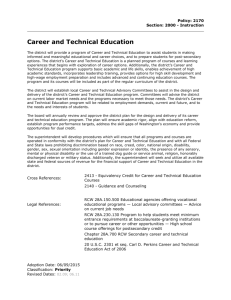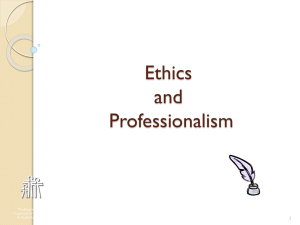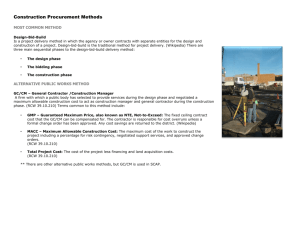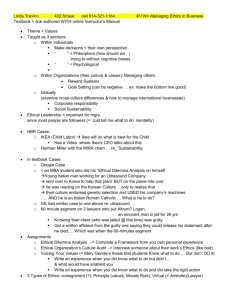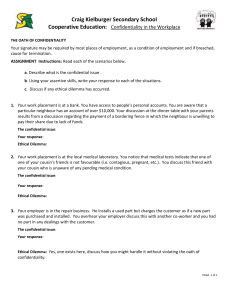Welcome to Ethics Training!
advertisement
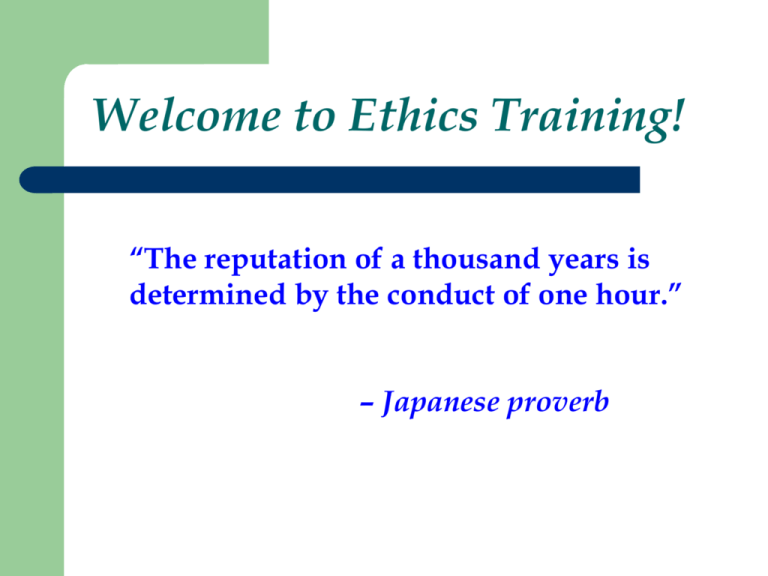
Welcome to Ethics Training! “The reputation of a thousand years is determined by the conduct of one hour.” – Japanese proverb Training Objective Clear Understanding of the Ethics in Public Service Act Update on Recent Rules Changes Resources for questions Ethics The embodiment of those values that the person or organization feels are important…, and spell our proper conduct and appropriate action. - Merriam Webster Ethical Choices What you find is that the tough ethical choices are not between good and evil, but rather between two goods: Truth versus Loyalty Individual versus Community Short-term versus Long-term Justice versus Mercy Ethical Principals Objectivity Selflessness Stewardship Transparency Integrity Objectivity Public employees must place the public’s interest before any private interest or outside obligation - choices need to made on the merits. • RCW 42.52.020, Activities incompatible with public duties • RCW 42.52.030, Financial interests in transactions • RCW 42.52.040, Assisting in transactions Conflict of Interest A conflict of interest occurs when you have a private interest that may benefit from your actions, or when a private interest could interfere with official duties An interest need not be financial to create a conflict of interest Most conflicts result from the exercise of discretionary authority Dilemma You are a health inspector with a partnership interest in a local restaurant, and are assigned to perform an inspection of this same restaurant. Can you conduct the inspection? What actions should you take? Dilemma A state employee serves on the board of directors for a non-profit organization. The non-profit bids on a contract from the employee’s agency. The employee serves on the review panel that will select the successful contractor. Can the employee serve on the review panel even though there is no personal benefit? Dilemma You enforce business license requirements. You discover that a local business, with with you have a private legal dispute, is overdue in paying its taxes. What would you do? Selflessness Public employees should not make decisions in order to gain financial or other benefits for themselves, their family, or their friends. •RCW 42.52.070, Special privileges •RCW 42.52.140, Gifts •RCW 42.52.150, Limitations on gifts •RCW 42.52.080, Employment after public service Use of State Position A state officer or employee may not use his or her state position to secure special privileges or to grant exemptions to benefit himself, herself, family members, or other persons. Gifts General rules Those items that are not gifts Those items that are gifts, but not subject to the $50 limitation Rebuttable presumption these do not influence The only items that may be accepted by employees who contract or regulate Post-state Employment Former state officers or employees may not benefit from state employment Contract restriction Beneficial interest restriction Offers of employment Prohibition against participating in previous state transactions Situations are fact-specific Dilemma You receive a plaque and a $100 check from the Institute of Government Financial Managers for your many contributions to the field. Can you accept the plaque and the check? Dilemma You supervise a contract with ABC Audits. ABC is sponsoring a regional conference and tells you that if you attend, ABC will waive your conference fees. Can you accept the waiver of conference fees? Dilemma You are a professor for a state university or community college and a publisher sends you a textbook (solicited or unsolicited) for evaluation. After completing your evaluation, you take the textbook home and sell it to a friend for $25. Is this activity a violation of the Ethics in Public Service Act? Textbooks On September 12, 2003, the Executive Ethics Board issued Advisory Opinion 03-04 that prohibits selling textbooks for personal profit. There are several options for disposing of textbooks in lieu of selling them. State supported institutions of higher education may want to consider adopting policies or procedures that assist faculty members in exercising these options. For example, faculty may dispose of textbooks and other publications by giving them to the institution, to a charity or educational foundation, or in accordance with agency surplus property procedures. Ethical Habits “A long habit of not thinking a thing wrong gives it the superficial appearance of being right.” –Thomas Paine Stewardship Public employees have a duty to conserve public resources and funds against misuse and abuse. •RCW 42.52.070, Special privileges • RCW 42.52.160, Use of persons, money, or property for private gain • RCW 42.52.180, Use of public resources for political campaigns • WAC 292-110-010 Questions to Ask Yourself • Will my use of state resources result in added costs or any other disadvantage to the state? • Am I using this resource in order to avoid personal expense? • Am I confident that my use of state resources will not compromise the security or integrity of state information or software? • Are state resources being used for purposes that could be embarrassing for my agency if reported publicly? The Use Zones Public employees have a duty to conserve public resources and funds against misuse and abuse. • Green Zone – Official Duties • Yellow Zone – Personal Use Under Limited Circumstances • Red Zone – Prohibited Uses The Green Zone •Any Use that is Reasonably Related to Your Official Duties •Combined Fund Campaign The Yellow Zone •Personal Use OK Under Limited Circumstances •Really de minimis exceptions • There is little or no cost to the state; • There is no interference with the performance of official duties; • The use is brief in duration and frequency; The use does not distract from the conduct of state business; and The use does not disrupt other state employees and does not obligate them to make a personal use of state resources; and The Red Zone •Prohibited Uses • Outside business interests • Commercial uses • Illegal or unprofessional activities • Political activities, including lobbying Dilemma You send emails to your friend’s home computer from your state computer regarding personal plans for the weekend. Is this appropriate stewardship of state resources? Dilemma You ran across an article in TIME magazine that you want to share with friends and make several copies using the office’s copier. Is this appropriate stewardship of state resources? Dilemma You send an email to your senator opposing the confirmation of a nominee for federal office. Is this appropriate stewardship of state resources? Dilemma Your supervisor approves the use of a state computer to do course work for a class that will enhance your skills. Is this appropriate stewardship of state resources? Dilemma You send a brief email or make a brief, local call to check on your kids. Is this appropriate stewardship of state resources? Dilemma You access the Internet during a lunch break to check on your stock portfolio and transfer assets to a different fund. Is this appropriate stewardship of state resources? Quote “A perfect value consists in doing without witness all that we could have done in front of the entire world” - Nobel Laureate Gabriela Mistral Transparency Public employees must practice open and accountable government. They should be as open as possible about their decisions and actions, and protect truly confidential information. •RCW 42.52.050, Confidential information Confidential Information Standards that protect confidential information: Outside employment, business, or professional activities Disclosure for personal gain or benefit Disclosure to unauthorized person Public Records Standards for disclosure: May not intentionally act to conceal a record if under a personal obligation to release the record. May apply to e-mail communications Integrity Employees in public service should not place themselves under any financial or other obligation to outside individuals or organizations that might influence them in the performance of their duties. •RCW 42.52.020, Activities incompatible with public duties •RCW 42.52.110, Compensation for official duties or nonperformance •RCW 42.52.120, Compensation for outside activities •RCW 42.52.130, Honoraria Honoraria Honorarium defined Agency approval required May not be approved if donor: Is expected to seek contractual relations Is regulated by the agency Is reasonably expected to seek or oppose adoption of rules or policy changes by your agency Outside Compensation Work must be bona fide and actually performed; and, Not related to a contract or grant you supervise; Comply with agency policies on outside employment; Not be compensated by anyone you contract with or regulate; Not related to a contract or grant you authorize; Cannot involve the disclosure of confidential information. Quote “If … you can’t be a good example, then you’ll just have to be a horrible warning.” - Catherine Aird Executive Ethics Board Interprets and enforces the ethics law Issues advisory opinions Reviews agency ethics policies Investigates and hears complaints Imposes sanctions for violations Disciplinary action also may be taken by the agency Complaint Status 136 140 C O M P L A I N T S 113 120 13 88 87 100 119 80 40 60 103 85 40 48 20 17 2 0 2000 2001 2002 Year 2003 Good People - Bad Choices (1998–2002) - 89 of Cases involving sanctions In 2001 - 35% of cases involved sanctions Civil Penalties $123,900 - $1393 average Suspended $491 average Investigative Costs $41,125 - $462 average Agency Restitution $16,527 Good People - Bad Choices Deadlines or performance goals Lack of resources, human or otherwise Pressures to produce and get the job done The action is not really illegal or unethical The action is in the individual’s or organization’s best interests The action will never be discovered Fear of authority Briefly Daily decisions will guide us in crisis Values can be instilled Subordinates seek standards Choice is often between two “goods” “Only a leader of courageous ethical standards can earn the trust of subordinates” Interventions Establish workplace expectations Brief common ethical problems Publicize noteworthy role models Routinely raise potential ethics issues Review commitment to ethics annually Attend to the ethical treatment of others
